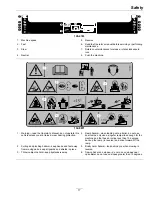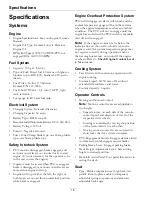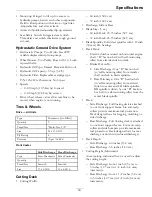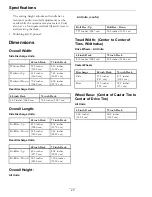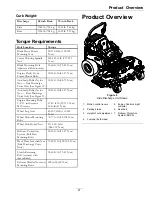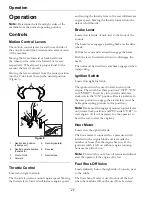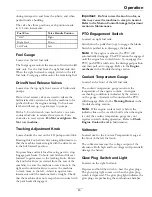
Safety
•
Replace a damaged ROPS. Do Not repair or
revise.
•
Any accessories, alterations, or attachments added
to the ROPS must be approved by Exmark.
Maintenance and Storage
•
Disengage drives, set parking brake, stop engine
and remove key. Wait for all movement to stop
before adjusting, cleaning or repairing.
•
Keep engine and engine area free from
accumulation of grass, leaves, excessive grease
or oil, and other debris which can accumulate
in these areas. These materials can become
combustible and may result in a fire.
•
Let engine cool before storing and Do Not store
near flame or any enclosed area where open pilot
lights or heat appliances are present.
•
Shut off fuel while storing or transporting. Do
Not store fuel near flames or drain indoors.
•
Park machine on level ground. Never allow
untrained personnel to service machine.
•
Use jack stands to support components when
required.
•
Carefully release pressure from components with
stored energy.
•
Disconnect battery before making any repairs.
Disconnect the negative terminal first and the
positive last. Reconnect positive first and negative
last.
•
Use care when checking blades. Wrap the blade(s)
or wear gloves, and use caution when servicing
them. Only replace damaged blades. Never
straighten or weld them.
•
Keep hands and feet away from moving parts.
If possible, Do Not make adjustments with the
engine running.
•
Charge batteries in an open well ventilated area,
away from spark and flames. Unplug charger
before connecting or disconnecting from battery.
Wear protective clothing and use insulated tools.
DANGER
Charging or jump starting the battery may
produce explosive gases. Battery gases can
explode causing serious injury.
•
Keep sparks, flames, or cigarettes away
from battery.
•
Ventilate when charging or using battery
in an enclosed space.
•
Make sure venting path of battery is
always open once battery is filled with
acid.
•
Always shield eyes and face from battery.
DANGER
Battery electrolyte contains sulfuric acid,
which is poisonous and can cause severe
burns. Swallowing electrolyte can be fatal or
if it touches skin can cause severe burns.
•
Wear safety glasses to shield eyes, and
rubber gloves to protect skin and clothing
when handling electrolyte.
•
Do Not swallow electrolyte.
•
In the event of an accident, flush with
water and call a doctor immediately.
CAUTION
If the ignition is in the “ON” position there
is potential for sparks and engagement of
components. Sparks could cause an explosion
or moving parts could accidentally engage
causing personal injury.
Be sure ignition switch is in the “OFF”
position before charging the battery.
•
Keep all guards, shields and all safety devices in
place and in safe working condition.
•
Check all bolts frequently to maintain proper
tightness.
•
Frequently check for worn or deteriorating
components that could create a hazard.
9

















